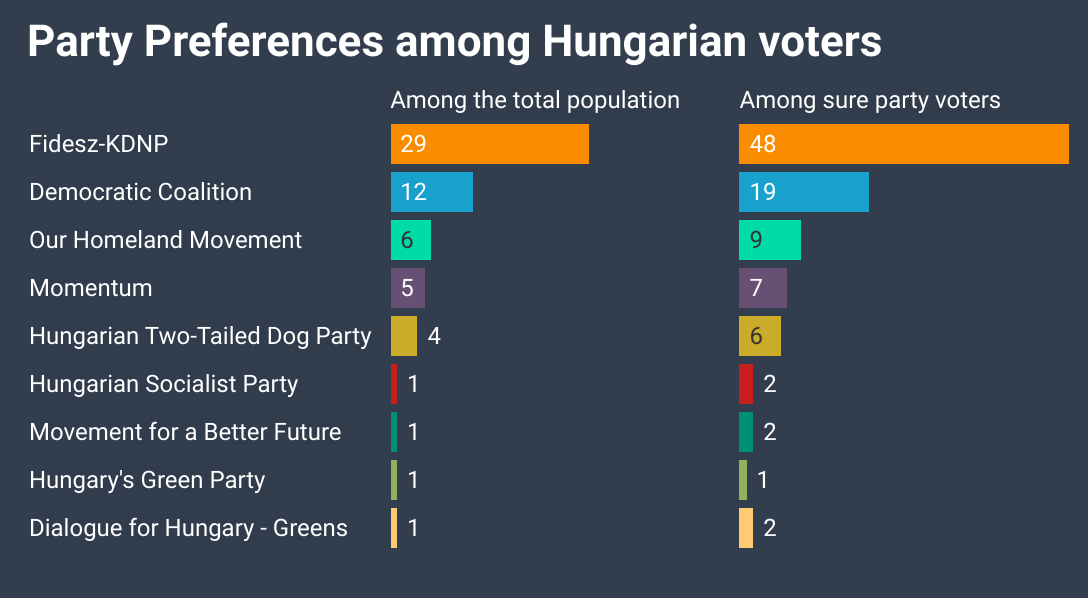
Dániel Deák's book analyzes the "constant campaign mode" of Hungary's governing party.Continue reading

According to the latest poll by the IDEA Institute, four opposition parties only have 1% support, and only three opposition parties would be able to enter parliament on their own in a recent election. This suggests that opposition parties would probably need to unite next year to do well in EP and municipal elections.
According to a representative survey by the IDEA Institute, support for the governing Fidesz and KDNP parties has not changed among the total voting age population, with 29 percent of them saying they would vote for Fidesz-KDNP in an election. In the narrowest, but most active voter group, those who vote for a party they are sure to vote for, there has been no change: support for Fidesz remains at 48 percent. As reported, Fidesz’s dominance is not threatened by any opposition party.
However, the opposition parties are in more trouble, with only three of them having the support needed to enter parliament on their own.
The Democratic Coalition (Demokratikus Koalíció, DK), led by former Socialist Prime Minister Ferenc Gyurcsány, has the largest support, at 12 percent.
Moreover, this party has been gaining more strength recently, with a number of politicians from other parties joining them, probably because they are moving towards the stronger power. DK even formed a shadow cabinet, trying to copy a British tradition that has no roots in the Hungarian political system. The shadow prime minister is Klára Dobrev, MEP of the Democratic Coalition, and wife of Ferenc Gyurcsány.
The nationalist Our Homeland Movement (Mi Hazánk Mozgalom), which has a 6 percent support rating, and Momentum, which has a 5 percent voter base, could also enter parliament on their own.
However, the Hungarian Socialist Party (MSZP), Movement for a Better Hungary (Jobbik), Dialogue for Hungary – Greens (Párbeszéd – Zöldek; currently busy with such important things as changing their name), and Hungary’s Green Party (LMP – Magyarország Zöld Pártja) may have headaches, as these four parties are all polling at just 1 percent, according to the IDEA Institute.
Yet these parties all currently have seats in parliament, but this is because they joined the opposition coalition in the 2022 parliamentary elections, otherwise they probably would not have been able to achieve such results on their own. Even the Hungarian Two-Tailed Dog Party, which started out as a joke party, has a four percent support rating, far outstripping the Hungarian Socialist Party, which has a long history in Hungary. Ferenc Gyurcsány, current leader of the Democratic Coalition, was the Socialist party’s prime minister between 2004 and 2009.
The share of those with unknown preferences has risen again by two percentage points to 38 percent, the survey found. Among those who are sure voters, the situation is no better for the four "micro-parties:" the four parties standing at 1 percent together have as much support as Momentum (7 percent), but the five parties together do not have as much voter support as the Democratic Coalition alone. Democratic Coalition (19 percent) is followed by Our Homeland with 9 percent support. It was found that in this narrow electoral segment, the Hungarian Two-Tailed Dog Party has already reached the 5 percent threshold (standing at 6 percent) for parliamentary representation.
According to the IDEA Institute,
it seems that Hungarian society is getting more and more tired of the constant party battles occurring among the opposition lately, so its distance from the parties is increasing month by month.
Next spring, two elections will be held in Hungary: the European Parliament election and the local elections. Political mobilization has already begun among the parties, but no decision has yet been made on whether the opposition parties will now join forces again to achieve greater success. What is clear from the polling data is that the four micro-parties would be in great need of an opposition coalition if they are to win in any of the constituencies or at the European level next year. However, based on what we have seen so far, it is possible that the Democratic Coalition wants to dominate the opposition platform and does not want to ally with others, as it is capable of doing a lot on its own.
Featured photo illustration by Hungary Today